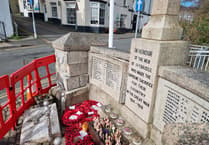One of the world’s leading experts on marine pollution is asking readers to keep an eye out for any Otrivin bottles washed up on our shores.
Professor Richard Thompson, of the faculty of biological and marine science at the University of Plymouth, was responding to our report last week about the large number of the bottles being found on the South Hams coast and as far afield as the Isle of Wight and northern France.
Based on our findings, Professor Thompson speculated that the shipping container may have broken open at the bottom of the sea due to recent storms and, if that was the case, there could be hundreds of thousands washing up.
He said that although it would be interesting to find out if the bottles had been at the bottom of the sea for some time and where they had orginally come from, “it’s not a witch hunt”.
He stressed the importance of understanding the legacy that pollution can have in the oceans and how things can resurface decades later. Because the bottles are fully intact and there aren’t lids on any of them, Prof Thompson doesn’t believe there is an immediate risk of toxins being released in the sea.
However, he said that once the bottles are exposed to the sun, warmer temperatures and oxygen, they will break down into smaller pieces, which would be harmful to marine life.
He also said that because of the size of the bottles, which are about three inches tall, fish and birds are unlikely to swallow them, but larger sea mammals, such as seals and dolphins, could be at risk.
“I’d be keen to see what we can learn from this incident,” Prof Thompson said.
He explained how we can learn from the oceanic distribution based on quantities that have been found, where they have been found and when, and any other information that could point to the location of the source.
He added: “There are a lot of misconceptions about where marine pollution comes from. People tend to assume most of it is from countries in south east Asia where there aren’t adequate waste management systems, but what people don’t realise is that most of the litter we find along the coast has come from local areas.
“It is important we emphasise that such a global problem can be solved by local actions and we can learn from our mistakes,” he said.
We then sent out an appeal through the newspaper and social media last week, and have continued to receive messages from people who have found Otrivin bottles along the coast.
On top of the some 950 bottles reported to us last week, additional bottles have been found at Bracklesham Bay, West Sussex, by Helen Frost; Barbara Thomson, from Plymstock, found a further 10 at Wembury; Vicky Rawlings and her daughter picked up about 20 at Mothecombe beach on November 11; Lucy Powell found one at Strete Gate; and Naomi Ainsley, from Modbury, found about 50 during a Christmas walk at Woody Bay, Isle of Wight.
The Maritime & Coastguard Agency said last week, in general terms, it is the polluter’s responsibility to arrange and pay for clean-up activity, however, where there is no identifiable source, the clean-up falls to the local authority which technically owns the relevant beach, coastline or harbour.
Cllr Rufus Gilbert, executive member for commercial services at South Hams District Council, said: “We were very dismayed to see the report last week about the plastic bottles which are washing up on South Hams beaches, and have been in discussion with the Maritime & Coastguard Agency about the best way to handle this.
“The loss of containers at sea can happen, and it can take some time between a container being lost and the materials washing up on our beaches. It’s unlikely that we can claim any financial aid to help with the clear-up. The good news, if there can be said to be any, is that these plastic bottles can be recycled in our clear sack household collections.
“They don’t appear to contain anything noxious or injurious to health, although, having been in the sea for goodness knows how long, they probably stink a bit.
“If you do find any and are able to take them home to put in your clear sack, we would be very grateful for your help, but the bottles will need to be thoroughly rinsed, as any sand in the material could affect the quality of the recycling.
“If you’d rather not take them home, please leave them in or alongside the public litter bins.
“As with all rubbish, please wear gloves if possible and wash your hands thoroughly afterwards.
“Meanwhile, a number of volunteer staff and members from South Hams are arranging times to try to collect as many as possible.”
Otrivin is manufactured by one of the world’s largest drug companies, Glaxo-SmithKline.
However, a spokesman for the company said: “The Otrivin bottles that have been found washed up on the coast across the south west were manufactured by a previous owner many years prior to GSK purchasing the brand in 2014.
“We cannot therefore shed any light on how they came to be there.
“As part of our commitment to our consumers, we have been conducting a comprehensive assessment of how we use plastics in the packaging of our products and will continue to seek further opportunities to innovate in an effort to reduce our plastic footprint.”
If you spot a bottle or bottles washed up on beach, please take a photograph if you can and email details to [email protected].
Please do not leave the bottle or bottles on the beach but take it home and recycle it with your other plastic containers, such as milk bottles.




